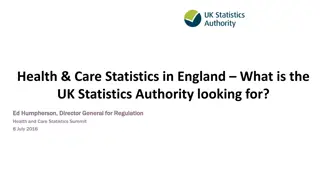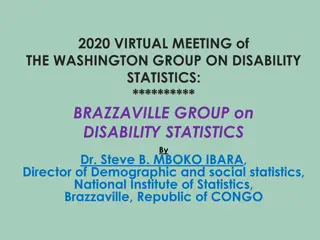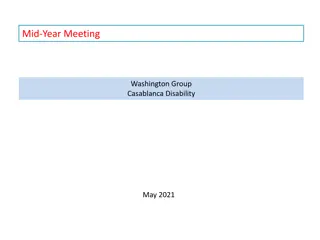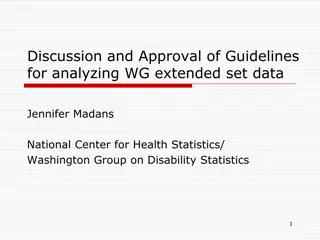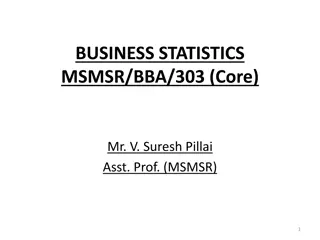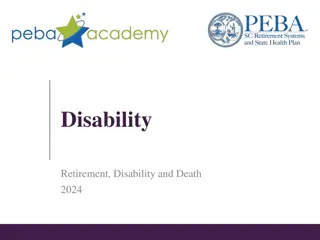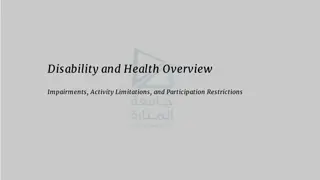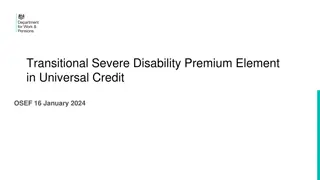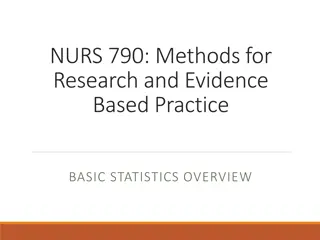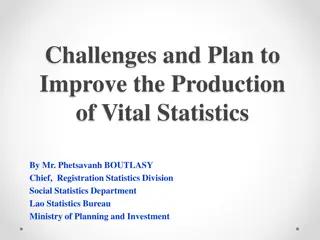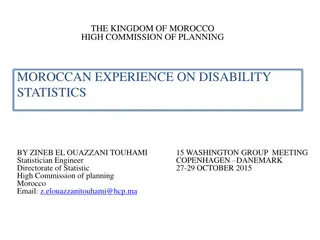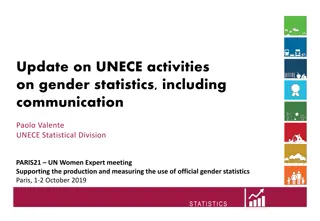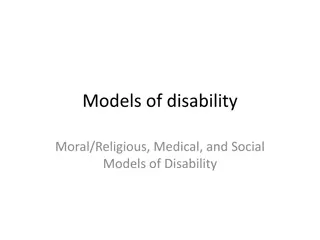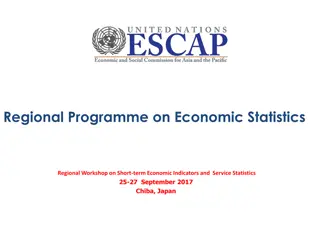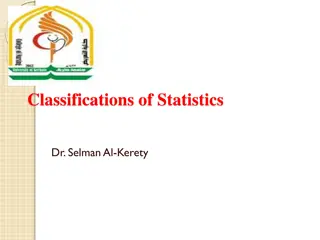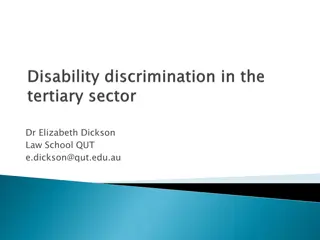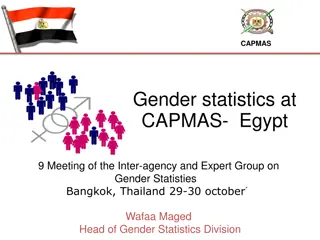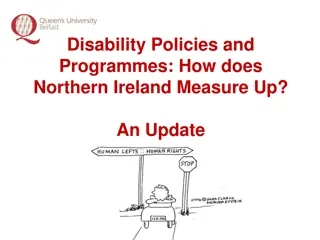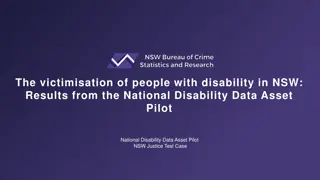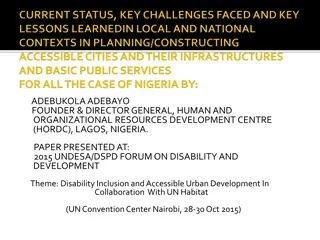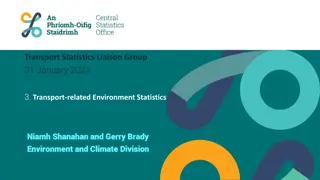Global Overview of Disability Statistics Activities
The annual activities related to disability statistics at the Fourteenth Meeting of the Washington Group on Disability Statistics in 2014 included participation from 44 countries across different regions. The meeting discussed new and updated information from various countries, monitoring the use of disability questions, and highlighted countries utilizing the WG short set in recent census cycles. Overall, there is a significant global effort towards improving disability data collection and reporting.
Download Presentation

Please find below an Image/Link to download the presentation.
The content on the website is provided AS IS for your information and personal use only. It may not be sold, licensed, or shared on other websites without obtaining consent from the author. Download presentation by click this link. If you encounter any issues during the download, it is possible that the publisher has removed the file from their server.
E N D
Presentation Transcript
Summary of Annual Activities Related to Disability Statistics Cordell Golden National Center for Health Statistics United States Fourteenth Meeting of the Washington Group on Disability Statistics 8-10 October 2014 Buenos Aires, Argentina
Responding Countries (n= 44) Africa/Middle East (8): Afghanistan, Egypt, Israel, Lesotho, Oman, Palestine, Tunisia, Yemen Asia/Pacific (11): Australia, Cambodia, China (Hong Kong SAR), China (Macao), Mongolia, New Zealand, Philippines, Samoa, Singapore, Thailand, Vanuatu Europe (15): Armenia, Croatia, Czech Republic, Denmark, Estonia, France, Germany, Hungary, Italy, Latvia, Lithuania, Netherlands, Poland, Spain, Sweden North/South America (10): Argentina, Aruba, Canada, Dominican Republic, Costa Rica, Mexico, Panama, Peru, St. Maarten, United States
New or updated information for 2014 New information (18): Afghanistan, Aruba, Australia, Cambodia, Canada, Costa Rica, Czech Republic, Denmark, Dominican Republic, Egypt, Estonia, Latvia, Netherlands, Samoa, Tunisia, United States, Vanuatu, Yemen Update of information previously provided (7): China (Hong Kong SAR), Croatia, France, Israel, Lesotho, Mexico, New Zealand No update from previous report (19): Argentina, Armenia, China (Macao), Germany, Hungary, Italy, Lithuania, Mongolia, Oman, Palestine, Panama, Peru, Philippines, Poland, Singapore, Spain, St. Maarten, Sweden, Thailand
Monitoring the use of the WG Short Set questions on disability
Countries using the WG short set or some variant in the most recent census cycle*(n=38) Argentina Aruba Bangladesh Brazil Cambodia Chad Costa Rica Croatia Dominican Republic Fiji Israel Italy Ivory Coast Kazakhstan Kenya Malawi Mexico Mongolia Mozambique Netherlands Antilles Oman Palestine Paraguay Peru Philippines Poland Qatar Rwanda Samoa St. Maarten South Africa Sri Lanka Tanzania Tunisia Turkey Uganda Vietnam Zimbabwe *Based on information obtained from 2009 - 2014 country reports
Countries indicating that the WG short set was included on previous censuses, national surveys, disability modules or pre-tests*(n=50) Afghanistan Argentina Armenia Aruba Bangladesh Bermuda Brazil Burundi Cambodia Canada Chad Croatia China China (Hong Kong SAR) Dominican Republic Egypt Estonia Fiji France Iran Israel Ivory Coast Japan Jordan Kazakhstan Kenya Latvia Malta Mexico Mongolia Mozambique Oman Palestine Panama Paraguay Peru Philippines Poland Qatar Rwanda St. Maarten South Africa Sri Lanka Thailand Turkey Uganda United Arab Emirates United States Yemen Zambia *Based on information obtained from 2009 - 2014 country reports
Reason short set of WG questions were not included WG questions were not finalized when last census or data collection was conducted (Afghanistan, United States) Required to use the same questions that were used in previous censuses or data collections (Canada, Croatia, France, Italy, Spain, Sweden) Not aware of the WG questions when planning previous data collection (Croatia, Lesotho, Samoa, Tunisia, Vanuatu) Disability questions are not asked on population census (China - Hong Kong SAR, Cyprus, Latvia, Lithuania, Spain) Disability is defined by other sources - administrative records, established surveys, and law (Armenia, Denmark, Germany, Lithuania, Sweden)
Reason short set of WG questions were not included (continued) WG questions did not fit the scope or purpose of the data collection (Australia, Costa Rica, Lithuania, Poland) Decisions regarding disability questions made by different organization or higher authority (Canada, Costa Rica, Cyprus, Hungary, Italy, Lithuania, Netherlands, Poland, Spain, Sweden, Vanuatu) Very difficulty to add new questions to data collection (Croatia) Too many questions/space restrictions (Lithuania, New Zealand) Questions similar to the WG short set have been used or will be used in the future (Costa Rica, United States) WG short set may be included in future census or data collection activities (Canada, Lesotho, Poland, Singapore, Sweden, Togo)
Use of administrative records to collect information on disability
Countries currently collecting or planning to collect information on disability from administrative records (n=20) Argentina Armenia Aruba Australia Croatia Denmark Estonia Germany Italy Latvia Lithuania Mexico Mongolia Oman Peru Philippines Poland Spain Thailand Vanuatu
Upcoming national data collection activities related to disability statistics
Type of data collection Census (5): Egypt, Hungary, Palestine, Philippines, Tunisia Survey (27): Afghanistan, Argentina, Aruba, Australia, Cambodia, Canada, Costa Rica, Czech Republic, Dominican Republic, France, Germany, Israel, Italy, Latvia, Lesotho, Lithuania, Mexico, Netherlands, New Zealand, Oman, Peru, Poland, Samoa, St. Maarten, Thailand, United States, Yemen Administrative Records (2): Estonia, Spain Census and Survey (1): Vanuatu Census and Administrative Records (1): Croatia Survey and Administrative Records (1): Denmark No scheduled data collection (7): Armenia, China (Hong Kong SAR), China (Macao), Mongolia, Panama, Singapore, Sweden
Date of most recent or upcoming data collection 2013 Germany New Zealand Oman Vanuatu 2014 Afghanistan Argentina Aruba* Cambodia Costa Rica Egypt France Latvia Lithuania Mexico Poland St Maarten Tunisia 2015 Aruba* Australia Canada* Denmark Estonia France Israel Italy Netherlands St Maarten 2016 Canada* Czech Republic Egypt Lesotho 2017 Canada* Dominican Republic Palestine Thailand *Multiple data collection activities scheduled 2020 Philippines 2021 Hungary
Frequency of data collection Ongoing (4): Croatia*, Netherlands, United States, Yemen Ad hoc/Periodically (2): St. Maarten, Vanuatu* Annually (6): Afghanistan, Canada*, Costa Rica, Estonia, Israel, Spain Every 2-4 years (7): Australia, Canada*, Denmark, Dominican Republic, France, Germany, Mexico* Every 5-10 years (18): Argentina, Canada*, Croatia*, Egypt, Hungary, Italy, Latvia, Lesotho, Lithuania, Mexico*, New Zealand, Palestine, Philippines, Poland, Samoa, Thailand, Tunisia, Vanuatu* Undetermined/Not specified (12):Armenia, Aruba, Cambodia, China (Hong Kong SAR), China (Macao), Czech Republic, Mongolia, Oman, Panama, Peru, Singapore, Sweden *Multiple data collection activities scheduled with different frequency intervals
Sampling Frame Most recent or upcoming Population Census (Argentina, Aruba, Canada, Costa Rica, Dominican Republic, Egypt, Germany, Lesotho, New Zealand, Oman, Palestine, Peru, Poland, Samoa, United States, Vanuatu, Yemen) National Population or Housing Registries(Afghanistan, Croatia, France, Germany, Hungary, Israel, Italy, Latvia, Lithuania, Mexico, Poland, St. Maarten, Spain) National Household or Labor Force Survey (Canada, Thailand) Government administrative records and other data sources (Latvia) Respondents identified as having an Activity Limitation in previous survey(Canada) Multi-stage sampling (Australia, Czech Republic, Netherlands, Italy) Random sampling (Cambodia, Denmark, Mexico, United States)
Sample Size Households: Persons: 1% : Germany 50%: Afghanistan 100%: Egypt, Tunisia 2,000 5,000: Denmark, Oman, Lithuania 5,001 10,000: Israel, Czech Republic, Netherlands 10,001 15,000: Hungary, Latvia, Italy 20,000 25,000: France, New Zealand, Spain 30,000 45,000: Canada* 141,026: Estonia 522,842: Croatia 600 1,000: Aruba, St. Maarten 2,000 5,000: Vanuatu, Cambodia, Samoa, Oman 13,440: Costa Rica 20,000 25,000: Yemen, Mexico, Poland 30,000: Dominican Republic 47,120: Mexico 72,800: Thailand 90,300: Canada 101,389: Mexico 222,960: Peru 19 Million: Philippines Enumeration areas: 223: Lesotho
Language data collection activity will be administered Arabic (6):Egypt, Israel, Oman, Palestine, Tunisia, Yemen English (with translation) (9): Aruba, Australia, Canada, Lesotho, New Zealand, Oman, Philippines, St. Maarten, United States French (2): Canada, France German (2): Germany, Italy Russian (2):Israel, Latvia Spanish (9):Argentina, Aruba, Costa Rica, Dominican Republic, Mexico, Netherlands, Peru, Spain, United States National or local language (19): Afghanistan, Aruba, Cambodia, Croatia, Czech Republic, Denmark, Germany, Hungary, Israel, Italy, Latvia, Lesotho, Lithuania, Philippines, Poland, Samoa, Spain, Thailand, Vanuatu Sign language (1):Argentina
Other national activities related to disability Working to determine the feasibility of implementing a national disability data registry Development of new administrative records related to disability Workgroup formed focusing on the development of disability indicators Pilot testing for upcoming censuses and surveys Evaluation of disability modules used in censuses and surveys Publication and dissemination of disability data and reports Discussions with government officials about future disability data collection activities Training workshops related to disability data collection




